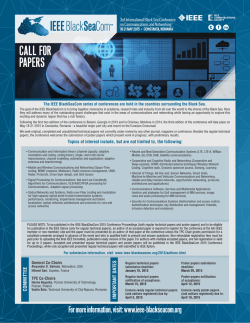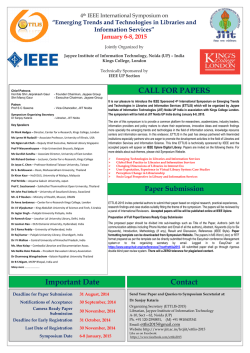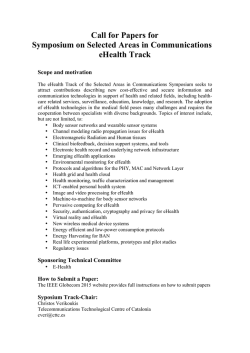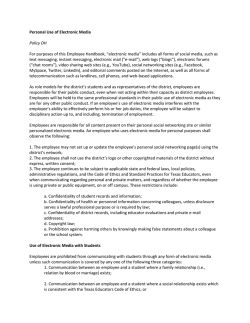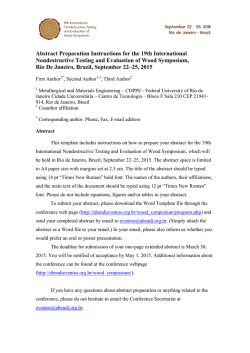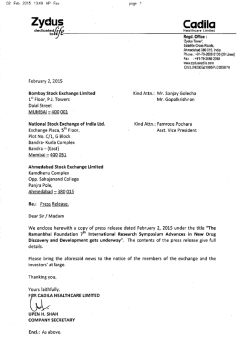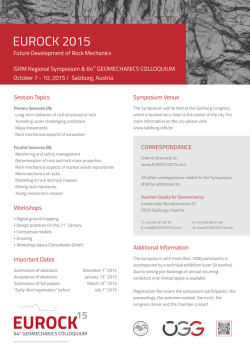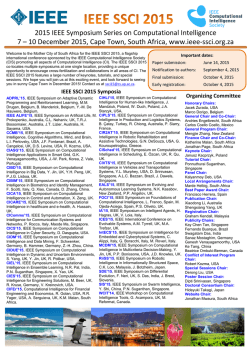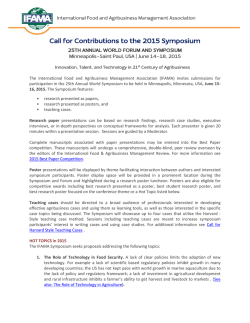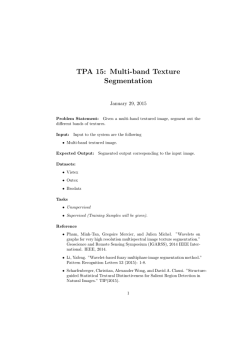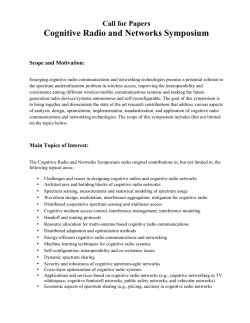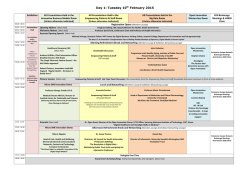
Symposium CfP - ieee globecom 2015
Call for Papers for Next-Generation Networking Symposium (Plus Track Name if Symposium on Selected Areas in Communications) Scope and Motivation: The focus of the Next-Generation Networking Symposium are emerging topics in the broad area of networking, with emphasis on software defined networks, datacenter, network heterogeneity, adaptability, flexibility, scalability, virtualization, security, manageability, dependability, performance predictability, and energy efficiency. The Symposium aims to consolidate and disseminate the latest developments and advancements in these emerging focus areas, and encourages participation from both academic and industry researchers working in the area of next-generation networking technologies, services, architectures, and protocols. Main Topics of Interest: The Next-Generation Networking Symposium seeks original contributions in the following topical areas,. Closely related topics not explicitly listed are also welcomed. Future Internet and Next-Generation Networking architectures Datacenter and cloud-based networking Software Defined Networking (SDN) and Network Function Virtualization (NFV) Heterogeneous multi-layer and multi-domain networks, including wirelesswireline internetworking Overlay networks and peer-to-peer networks Information centric and content-centric networks Network virtualization, virtual private networks (VPN) and services Unicast, multicast, and anycast routing Network survivability and network resilience strategies Next generation s witch and router architectures, Traffic scheduling, buffer management and QoS provisioning techniques Future Internet security, privacy, intrusion detection and prevention Traffic measurement, analysis, modeling, visualization, and engineering Mechanisms for self-organization, naming, mobility support, and autonomous networking Emerging Internet applications including interactive media, voice and video games, immersive applications, and applications for Internet of things Architecture and protocol design for Next-Generation Social Networking services Design methodologies for future Internet services Next-Generation access networking Network provisioning, monitoring, and management Energy-efficient protocol design and green communication Sponsoring Technical Committees: How to Submit a Paper: The IEEE Globecom 2015 website provides full instructions on how to submit papers. You will select the desired symposium when submitting. The paper submission deadline is April 1, 2015. Unlike recent ICC’s and Globecom’s, this is a hard deadline that will not be extended. Symposium Co-Chairs: Andrea Bianco, Politecnico di Torino, Italy, E-mail: [email protected] Pavan Nuggehalli, MediaTek USA, E-mail: [email protected] Biographies Andrea Bianco is Full Professor and Vice Head of the Electronics and Telecommunications Department of Politecnico di Torino, Italy. He has coauthored over 180 papers published in international journals and presented in leading international conferences in the area of telecommunication networks. He received two best paper awards, at HPSR 2006 and IEEE GLOBECOM 2009. He is Area Editor for the IEEE JLT (Journal of Lightwave Technology) and of the Elsevier Computer Communications journal. He was Technical Program CoChair for the High Performance Switching and Routing Symposium (HPSR) in 2003 and 2008, for DRCN (Design of Reliable Communication Networks) 2005, IEEE ICC 2010 (Optical Networks and Systems Symposium) and Networking 2015. He was a member of the TPC of several conferences, including IEEE INFOCOM, IEEE GLOBECOM, IEEE ICC, Networking, High Performance Switching and Routing (HPSR), IFIP Optical Networks Design and Modelling (ONDM), and Hot Interconnects. Andrea Bianco is an IEEE Senior Member. Prof. Bianco research interest include switching architectures, optical networks and SDN networking. Pavan Nuggehalli (S’98-M’03) received the B.Tech degree is electronics and communication engineering from the Regional Engineering College at Kurukshetra, India in 1996, the M.Sc (Engg.) degree in electrical sciences from the Indian Institute of Science, Bangalore in 1998, and the Ph.D. degree in electrical and computer engineering from the University of California at San Diego in 2003. He has worked in both academic and industrial settings. From 2003-2007, he was an assistant professor in the Indian Institute of Science and a visiting researcher (2006-2007) at the University of California, San Diego. Since 2007 he has been employed at several companies including Vanu, Beceem, Samsung, Broadcom, and MediaTek. Dr. Nuggehalli’s research interests comprise modeling, analysis, and simulation of wireless protocols at the MAC, network, and transport layers. He has authored over 30 papers in peer-reviewed journals and conferences and served on the technical program committees of several premier conferences. He is currently a technical manager at MediaTek USA in San Jose, California, where he represents MediaTek in 3GPP’s RAN2 working group. TPC Members (Tentative) To be defined (and if possible to be partly derived on EDAS from last year TPC)
© Copyright 2026
